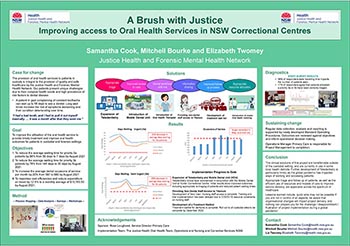The Justice Health and Forensic Mental Health Network is implementing six identified solutions to improve access to oral health services for people in custodial and forensic settings across NSW.
Aim
To improve access to patient-centered and equitable oral health services, by decreasing average waiting times for urgent dental care by 88 per cent (from 56 days to 7 days) by August 2021.
Benefits
- Improved patient access to oral health services.
- Increased patient and staff satisfaction with improved provision of services.
- Minimised need for patients to recontact the oral health call centre due to prolonged waiting times or missed opportunities for care.
- Maximised cost efficiency and improved use of resources.
- Increased patient contact (including Teledentistry) hours by dental team.
Background
An increase in the patient population, coupled with the complex health needs of patients in custody, has resulted in increased demand for oral health services across NSW.
This increase has contributed to prolonged waiting time for patients and budget overspend, especially on travel related expenses for dental staff. Dental staff are travelling to rural correctional centres more frequently resulting in fewer patients being seen as travel requirements take place during their workday. Additionally working away from home has a negative impact on employee family/work life balance.
At the start of the project, there were 2,053 patients on the oral health waitlist. A patient in gaol complaining of constant toothache could be waiting up to 56 days to see a dentist.
This redesign project was undertaken to improve the utilisation of the Justice Health oral health service to provide timely treatment and improve oral health outcomes for patients.
Implementation
A review of waitlists, processes and resources led to the development of six solutions for implementation. Complete implementation has been postponed due to the impact of the COVID-19 pandemic on resource allocation, dental treatment restrictions and the requirement of social distancing.
1. Expansion of teledentistry
Teledentistry clinics have commenced in conjunction with the mobile dental unit (MDU) at Hunter Correctional Centre. Initial results show improved outcomes including appropriate re-triaging of patients and reduced patient waiting times.
2. Mobile dental unit
The MDU is being rostered regularly for use in centres where dental clinics do not exist, or access to patients is difficult.
3. Introduction of oral health therapist
The position description and approval brief for this new position has been developed and is ready for progress, pending the identification of a funding source.
4. Providing non-dental staff access to titanium
Development of nursing staff access to the titanium program is complete. Training and trial implementation has been delayed due to COVID-19 resource constraints on nursing staff. Negotiation regarding licence numbers to sustain this solution without further investment continue.
5. Development of a treatment waitlist
The treatment waitlist for dentures is complete. Second stage telehealth treatment waitlist also complete. Roll out to other custodial sites to be completed by December 2020.
6. Development of cluster based rostering system
An ongoing industrial relations dispute with the dental officers has prevented further development of this roster. Implementation postponed to 2021.
Status
Implementation – The project is ready for implementation or is currently being implemented, piloted or tested.
Dates
August 2019 to August 2021
Implementation Sites
Mobile dental unit and teledentistry have been implemented at Hunter Correctional Centre, the Kevin Waller Unit, the Aged Care Rehabilitation Unit, Bathurst and Lithgow. The denture treatment waiting list has been implemented statewide.
Partnerships
Corrective Services NSW, eHealth, Agency for Clinical Innovation.
Evaluation or Results
A complete evaluation will occur December 2021 with focus on the following.
- Average waiting times for patients accessing urgent and semi urgent dental appointments
- Number of patients waiting outside of recommended maximum waiting times
- Occasions of service per month
- Monthly travel costs
- Patient and staff satisfaction.
Initial results from the implementation of the MDU at Hunter Correctional Centre has shown the number of urgent and semi urgent patients waiting to access care has decreased by 84.9% from 52 to 21; and the average waiting time has decreased by 80.95% from 59 to 25 days. Patient satisfaction with the MDU is high, with 100% of patients surveyed stating the care they received was good to very good.
Lessons Learnt
- Quick wins may not always be quick if you are not in control of all aspects.
- Increased challenges of project implementation during a global pandemic.
Further Reading
- NSW Ministry of Health. Oral Health 2020: A Strategic Framework for Dental Health in NSW. Centre for Oral Health Strategy. Sydney: NSW Ministry of Health; 2013.
- Centre for Oral Health Strategy. Priority Oral Health Program (POHP) and Waiting List Management. PD2017_023. Sydney: NSW Ministry of Health; 2017.
- Justice Health and Forensic Mental Health Network. Patients’ Experiences and Perceptions Study (PEaPS) Report. Sydney: Justice Health and Forensic Mental Health Network; 2019.
Contact
Samantha Cook, Operations Manager Primary Care, Services & Programs
Justice Health & Forensic Mental Health Network
Phone: (02) 9700 2218|
Samantha.Cook@health.nsw.gov.au
Mitchell Bourke, Operations Manager Primary Care, Clinical
Justice Health & Forensic Mental Health Network
Phone: (02) 9700 3241|
Mitchell.Bourke@health.nsw.gov.au
Liz Twomey
NUM Aged Care and Rehabilitation Unit
Phone: (02) 9700 3284
Elizabeth.Twomey@health.nsw.gov.au
